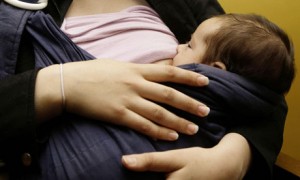Next up in the series of The Global Differences of Baby-Making I talk to Carrieanne who is American and had her daughter in France. Here is her story:
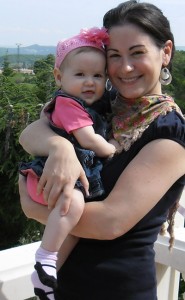 Tell me a bit about yourself? Where are you from? How old is your daughter and where did you have her?
Tell me a bit about yourself? Where are you from? How old is your daughter and where did you have her?
I am a 29-year-old American writer. I was born in Connecticut, but raised on the sunny beaches of Florida. I spent my days as the head of a multimillion-dollar corporation and nights dreaming of living overseas. I met my future husband while on vacation in France. He moved to the USA and followed me to Montreal. Eventually, I gave up life in the fast lane and followed him back to France. Our little French American girl was born in Bayeux, France last year.
Why did you have your daughter abroad?
We decided to start our family in France because we both preferred life here. I entertained the idea of going back to the USA, but there were many obstacles.
If we moved to the USA, it takes months to recieve a spouse Visa. My husband would have to wait in France while I prepare the application in the USA. I did not want to be separated from him for that long.
Also, we are self-employed so health insurance would be expensive. I do not think insurers cover pregnancies if the applicant is already pregnant. In France, our mutual (private health insurance) costs 70 euros per month and we are 100% covered. Last year I broke a finger and was pregnant – we paid nothing out-of-pocket. Healthcare in the USA is so expensive that it would not make financial sense for us to have a baby there.
What do you feel were the benefits to having children abroad?
I like that everyone in France gets standard care. It does not matter which doctor you see, you know when you will have your ultrasounds, which blood tests will be done, and when your next appointment will be. In the USA, each doctor handles pregnancies very differently. Even though care for pregnancies is standard in France, doctors are not limited. If they think additional tests or ultrasounds are needed, they can prescribe them.
Besides free healthcare, another incredible benefit was qualifying for maternity leave. I am self-employed, yet I received about 6,500 euros for taking time off work. We also received about 900 euros from social security when I was 7 months pregnant, and 150 euros from our mutual as a gift. Now, we receive money for her each month and will recieve 9 hours of in-home daycare for free each month. I could not imagine getting all this in the USA.
As an expectant mother abroad how did you feel?
I was scared and anxious at the beginning of my pregnancy. I had no idea what to expect. I could not find the information I needed online and did not have the vocabulary to communicate efficiently with doctors. I was frustrated because I felt out of control. As I gained more information and my French became better, I felt more at ease with the situation.
Blogging about my pregnancy in France helped me relax. It felt great to provide others with information that I could not find online. I received encouragement and support from my readers, which kept me going whenever I felt frustrated.
Did you encounter any opinions that would have been different in your home country with regards to your pregnancy or parenting choices?
When I was pregnant, it felt like my gynecologist was not taking me seriously when I requested a natural birth. I watched a story on the news a few nights ago and think that attitudes here are changing. Many French women are beginning to demand a less medicalized approach to giving birth.
After my daughter was born, I was almost forced to bottlefeed while in the hospital. The puericultrice and midwives took my husband aside and convinced him that I was endangering our daughter by breastfeeding. It was very emotional and difficult for me to stand my ground, especially without the full support of my husband. We later figured out that my daughter was not latching properly, and then she gained weight quickly. If I was in the USA, I could have left the hospital after she was born, met with a lactation consultant, and avoided all this stress.
What advice would you give other mothers in your situation?
Relax and learn French. It is important for you to be able to communicate efficiently with the doctors and midwives. If you usually count on your husband or significant other for translations, understand that there will be times when he will not be there. My husband is an English to French translator, but there were pregnancy-related terminologies that even he could not translate.
If you find yourself pregnant in France, I wrote a book specifically for you – French Mamma’s: Pregnant in France. I provide details of what to expect, including the standard medical schedule, emergency contact information, and sample ultrasound results. All chapters are in English and French, with important pregnancy-related vocabulary words that you should know. At the end of each chapter are practice sentences to help you learn the vocabulary words, as well as an answer key. You can download the first two chapters for free on my website.
You can read more about being pregnant in France on my French Mamma blog, or follow me onTwitter or Facebook.
******
Want to share your story? Get in touch

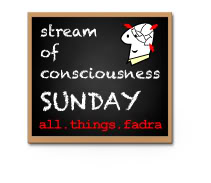 Here is my 5 minute brain dump as part of this great series. Here goes …
Here is my 5 minute brain dump as part of this great series. Here goes …
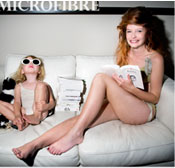
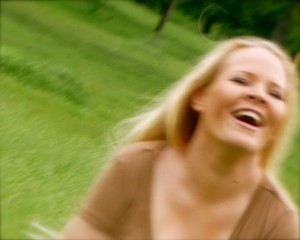 Tell me a bit about yourself? Where are you from? How old is your daughter and where did you have her? I’m a Finnish singer-songwriter and pianist, mommy of one magnificent daughter… and not so long ago, a performer in a chic Paris piano-bar located somewhere between the Ritz and the old Opèra. As my 8-month pregnant belly no longer fit behind the bar’s grand piano, and my squeezed lungs became unable to yell ‘Proud Mary’ at 4 A.M. without me passing out on the keys, I gave up my night job and retreated to my horrid apartment.
Tell me a bit about yourself? Where are you from? How old is your daughter and where did you have her? I’m a Finnish singer-songwriter and pianist, mommy of one magnificent daughter… and not so long ago, a performer in a chic Paris piano-bar located somewhere between the Ritz and the old Opèra. As my 8-month pregnant belly no longer fit behind the bar’s grand piano, and my squeezed lungs became unable to yell ‘Proud Mary’ at 4 A.M. without me passing out on the keys, I gave up my night job and retreated to my horrid apartment.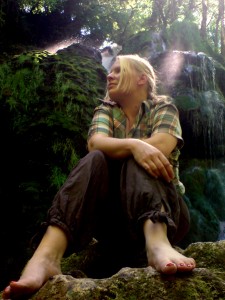


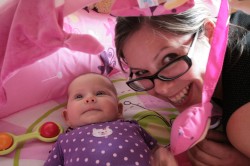 This week I talk to
This week I talk to  I am back in France, once again as part of the series
I am back in France, once again as part of the series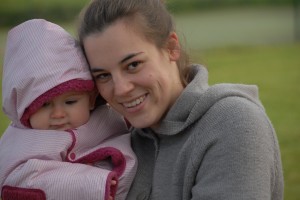
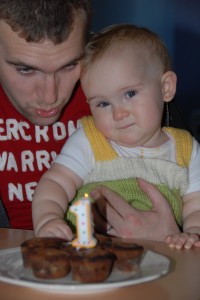 I (still) breastfeed my daughter more or less on demand. She co-slept for a long time, and still does sometimes, I don’t spank, I don’t have strict mealtimes, I don’t let my child cry it out, and I don’t read any ‘parenting’ books. I’d much rather follow my heart and my child’s lead. Parents like us in France are rare. I feel like in the US I would have been able to find a group of like minded parents with more ease.
I (still) breastfeed my daughter more or less on demand. She co-slept for a long time, and still does sometimes, I don’t spank, I don’t have strict mealtimes, I don’t let my child cry it out, and I don’t read any ‘parenting’ books. I’d much rather follow my heart and my child’s lead. Parents like us in France are rare. I feel like in the US I would have been able to find a group of like minded parents with more ease.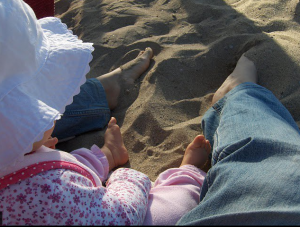 Tell me a bit about yourself? Where are you from? How old is your daughter and where did you have her?
Tell me a bit about yourself? Where are you from? How old is your daughter and where did you have her?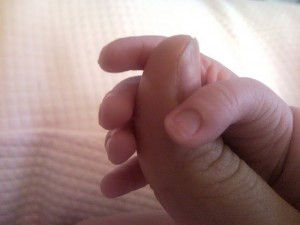 When I was 24 weeks along, a member of my family passed away and I was heartbroken. I had such a hard time being so far away from the rest of my family. I felt so alone. I realize it’s still difficult to write about it. Three weeks later I had my scheduled sonogram and we found that the baby’s abdominal circumference was not as it should be — in other words, our baby was “skinny”. My OB sent me to get different tests immediately and sonograms done over the next few weeks followed and it turns out everything was just fine… but I really needed to take my stress level down for a while, since it might have been what had affected me and the baby. Hard to do, but the baby got back on track very quick.
When I was 24 weeks along, a member of my family passed away and I was heartbroken. I had such a hard time being so far away from the rest of my family. I felt so alone. I realize it’s still difficult to write about it. Three weeks later I had my scheduled sonogram and we found that the baby’s abdominal circumference was not as it should be — in other words, our baby was “skinny”. My OB sent me to get different tests immediately and sonograms done over the next few weeks followed and it turns out everything was just fine… but I really needed to take my stress level down for a while, since it might have been what had affected me and the baby. Hard to do, but the baby got back on track very quick.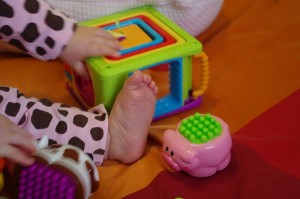 My friends abroad were never tested for this and here I was getting blood drawn every month to check I did not suddenly have the parasite!!! I guess after 7 years of living in France and no parasite (since according to Wikipedia 88% of the French have it but it’s not as common in the US) I should have just kept my old habits, but here I was desperately trying to eat strawberries (the baby wanted them!) and I had bought my special fruit brush where I would brush each strawberry and wash them for over 20 minutes so I could eat them in less than 20 seconds.
My friends abroad were never tested for this and here I was getting blood drawn every month to check I did not suddenly have the parasite!!! I guess after 7 years of living in France and no parasite (since according to Wikipedia 88% of the French have it but it’s not as common in the US) I should have just kept my old habits, but here I was desperately trying to eat strawberries (the baby wanted them!) and I had bought my special fruit brush where I would brush each strawberry and wash them for over 20 minutes so I could eat them in less than 20 seconds.
